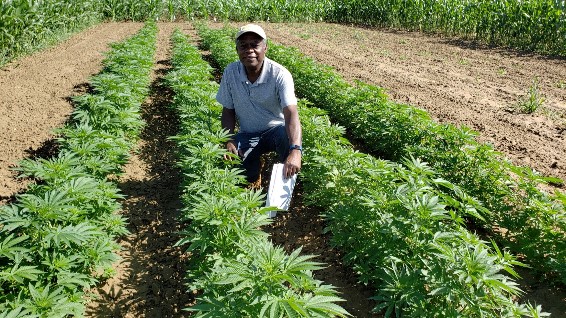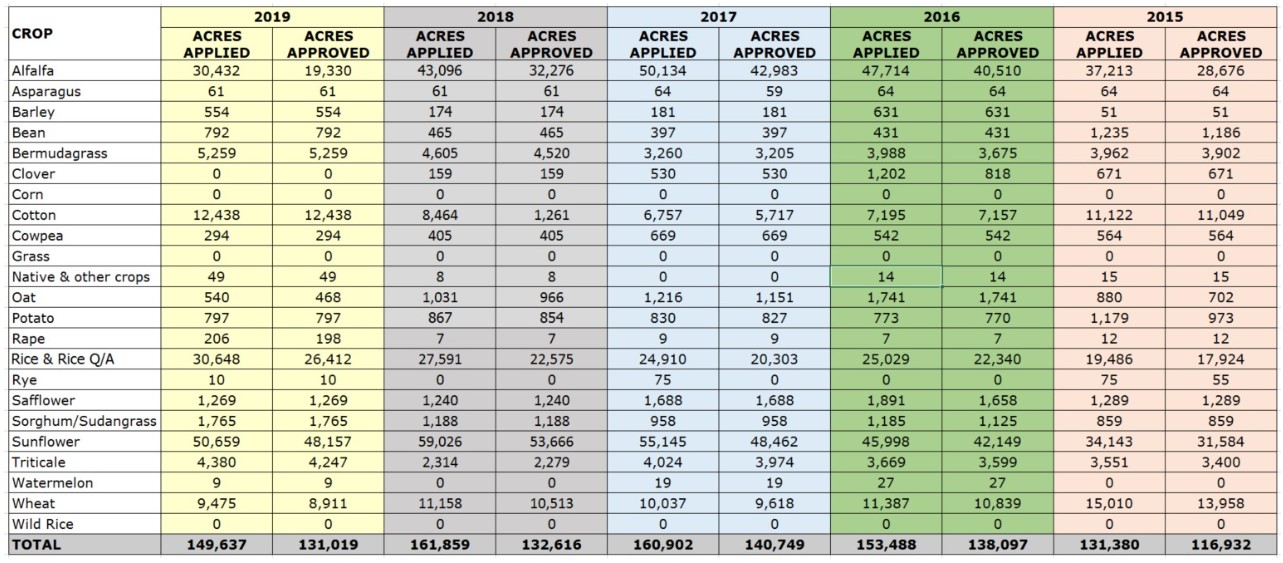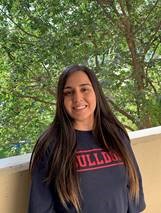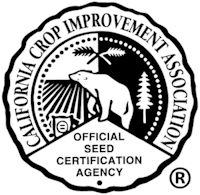In Memoriam - Jack DeWit
 Jack DeWit was an outstanding human being. He was an innovative grower of rice (and wild rice), a philanthropist, and an all-around great guy. He had been a member of the CCIA Board of Directors since 1988 where he served as President, Vice-President, and Treasurer over the years. He was an outspoken director whose vast experience and heritage knowledge made him an extremely valued presence. His success as a farmer enabled him to help many others with educational scholarships and personal notes of encouragement. He was a Cal Aggie through and through. He was captain of the UC Davis football team in 1965 and later created the Jacob Wayne DeWit Student-Athlete Award, an endowment in honor of his grandson, Jacob, to provide funding for a football student-athlete studying early childhood development, special education, pre-med pediatrics or pediatric developmental research including autism, Asperger syndrome or other related complex neurological infirmities. Jack loved to help young people reach their goals. We are all very blessed to have known Jack.
Jack DeWit was an outstanding human being. He was an innovative grower of rice (and wild rice), a philanthropist, and an all-around great guy. He had been a member of the CCIA Board of Directors since 1988 where he served as President, Vice-President, and Treasurer over the years. He was an outspoken director whose vast experience and heritage knowledge made him an extremely valued presence. His success as a farmer enabled him to help many others with educational scholarships and personal notes of encouragement. He was a Cal Aggie through and through. He was captain of the UC Davis football team in 1965 and later created the Jacob Wayne DeWit Student-Athlete Award, an endowment in honor of his grandson, Jacob, to provide funding for a football student-athlete studying early childhood development, special education, pre-med pediatrics or pediatric developmental research including autism, Asperger syndrome or other related complex neurological infirmities. Jack loved to help young people reach their goals. We are all very blessed to have known Jack.
CCIA President Lance Atkins Stepping-down
Lance Atkins, current President of the CCIA Board of Directors, will soon be stepping-down to pursue a new opportunity with his employer, Syngenta Seeds. For many years, Lance has been the Lead of North American Sunflower Operations for Syngenta. He recently accepted a new assignment in soybean marketing and will be moving to Illinois in December. Lance has been an outstanding member of the CCIA Board since 2016 and we are very sorry to see him go. We thank him for his excellent service to the California Crop Improvement Association and wish him the very best!
Research Funds Awarded for 2019-2020
Research fees are collected on several crops; the funds collected are awarded each year for research to improve these crops. Research grants were awarded at the June Board of Directors meeting as follows:
Alfalfa
$30,000 - Dr. Dan Putnam “Alfalfa experimental variety and germplasm adaptation and evaluation”
$28,159 - Dr. Charles Brummer “Developing new alfalfa cultivars for California”
Beans
$14,550 - Foundation Seed Program to purchase a bean harvester
Cotton
$181,631 - California Cotton Ginners and Growers Association for research of their choice
Small Grains
$65,558 - Dr. Jorge Dubcovsky “Development of wheat varieties for California”
$57,140 - Dr. Mark Lundy “Evaluation of small grains in California”
$16,140 - Dr. Alicia del Blanco “Breeding malting barley for California”
$10,000 - Dr. Alicia del Blanco “Oat improvement for California”
Hemp Update
In June, at the 100th Annual Meeting of the Association of Official Seed Certifying Agencies (AOSCA), hemp featured prominently on the agenda. The Meeting approved the creation of the National Hemp Variety Review Board (NHVRB), which should begin functioning in fall, 2019. The Meeting also approved the Application Form for Hemp Variety Certification. This application is expected to be filled out by hemp breeders for the NHVRB to make a recommendation to approve variety certification if they determine that the variety is distinct, uniform, stable and meets the Farm Bill 2014 definition of hemp (i.e. have 0.3% THC or less). The National Meeting also approved an amended crop standard for production of certified hemp seed. This standard adjusted the earlier standard for field eligibility, isolation distances and the number of field inspections to be conducted. Our CCIA Certification Technical Committee (CTC) tweaked the standard for California and the CCIA Board of Directors approved it on September 24, 2019. The standard can be viewed on the CCIA website.
 Since most planting stock of hemp varieties grown for CBD come from clonal propagation or feminized seed production systems, AOSCA approved the formation of a Work Group to develop standards for production of this type of certified planting stock. Although the CCIA has developed online applications for ordinary certified hemp seed production, online applications for clonal propagation, hybrid seed production, and “feminized seed” production will not be finalized until the AOSCA Work Group concludes standards for these production systems. As such, the CCIA is currently not accepting applications for clonal propagation, hybrid production or feminized seed systems. Note that the CCIA is still awaiting final approval from the University of California and other regulatory organizations before fully implementing any of our hemp certification programs.
Since most planting stock of hemp varieties grown for CBD come from clonal propagation or feminized seed production systems, AOSCA approved the formation of a Work Group to develop standards for production of this type of certified planting stock. Although the CCIA has developed online applications for ordinary certified hemp seed production, online applications for clonal propagation, hybrid seed production, and “feminized seed” production will not be finalized until the AOSCA Work Group concludes standards for these production systems. As such, the CCIA is currently not accepting applications for clonal propagation, hybrid production or feminized seed systems. Note that the CCIA is still awaiting final approval from the University of California and other regulatory organizations before fully implementing any of our hemp certification programs.
In partnership with AOSCA, the Colorado Seed Growers Association organized a tour of hemp activities in Colorado in July, 2019. Each year, the Colorado Hemp Pilot Program conducts hemp variety trials jointly with the Colorado Seed Growers Association, in which varieties are tested across that state. Other AOSCA agencies can take advantage of the variety certification approvals supported by these trials. This year, eight varieties were tested at five sites. The varieties were grown and tested in the Northeast, the Arkansas Valley, the Front Range, the San Luis Valley, and on the Western Slope. These five locations differ in day and night temperatures, altitude, growing season length, and soil types and provide a broad representation of Colorado’s growing conditions. On January 7, 2019 the following varieties (which were tested in 2018) were approved: B11, CRS-1, Henola, Medicine Mother, Rajan, and VC Star. The California Crop Improvement Association Board of Directors recently also approved these cultivars for certified seed production in California. Three of the cultivars were bred by US breeders. The group toured a private breeding nursery near Fort Collins, Colorado as well as large production fields of feminized seed being grown by the “L7 Grain Company.” The group also viewed fields under the control of the “Bija Hemp Company” that were planted with “ordinary” seeds of two varieties, “Bialobrzeskie” and “Henola.” A great deal of certified seed is being produced in Colorado and this may be sourced for the next crop season by our growers in California. Seed of Bialobrzeskie and Henola may also be sourced from Poland via seed certification schemes conducted by the Organization for Economic Cooperation and Development (OECD). The Henola variety produces up to 3,000 pounds per acre of grain under irrigated conditions whereas the best established hemp varieties have only produced about 1,500 pounds per acre. Henola is capable of producing 8% CBD.
Questions regarding certified hemp seed production should be directed to Alex Mkandawire at 530-752-6868.
Seed Trade Association of Arizona Pinning Map
The CCIA provides online maps to track the location of a variety of crops. The Isolation Pinning Map is critical to the sunflower industry to track isolation distances between fields. There is also an Alfalfa Isolation Management Map to identify genetically engineered fields of alfalfa. Two specialty maps have been created for Idaho - the Treasure Valley Sweet Corn map and the Idaho-Eastern Oregon Vegetable Isolation (IEOSA) map. Recently we were asked to create a map for the Arizona Seed Trade Association. More information about maps and a demonstration map is available at the CCIA web site.
Crop Acreage Report (available as a pdf)

Scholarships Awarded
 CSU Fresno – Celeste Lara was born in Visalia, CA. Her family immigrated from different parts of Mexico to the San Joaquin Valley in the hopes of providing a better future for their children. After learning about how good the school systems were, her mother moved Celeste and her brother to Exeter, CA. It was at Exeter High School, notable for its FFA program, that she become interested in plant science.
CSU Fresno – Celeste Lara was born in Visalia, CA. Her family immigrated from different parts of Mexico to the San Joaquin Valley in the hopes of providing a better future for their children. After learning about how good the school systems were, her mother moved Celeste and her brother to Exeter, CA. It was at Exeter High School, notable for its FFA program, that she become interested in plant science.
While attending junior college, she was employed with the University of California Cooperative Extension in Tulare, CA with Dr. Bob Hutmacher, to work on a plant-breeding project aiming to breed resistant germplasm against Fusarium oxysporum fsp vasinfectum race 4 (FOV race 4). She worked with the UC for the past 4.5 years, advancing from a casual laborer, to a student assistant, and currently as a lab assistant.
She was inspired to attend Fresno State by coworkers who praised the Plant Science Department. During the past year, she has worked as a student assistant in the research lab of Dr. Maggie Ellis, a plant pathologist. This has enabled her to gain broader knowledge about plant pathogens and more insight into the science needed to develop resistant germplasm to FOV race 4.
She has a passion for the breeding project because of her experience, and this has also inspired her to pursue a master’s in Plant Breeding. Celeste has expressed appreciation for CCIA’s generosity and willingness to help students become future leaders in agriculture.
 UC Davis – Kyle Rizzo came to UC Davis wanting to learn what he could about agricultural theory and practice. Coming from a low-income, single mother household, he also has a willingness and desire to learn plus a sense of necessity to apply the information promptly and work towards financially independence. At Davis, he found so much information available that time to learn has become the limiting factor. He is studying the science of agronomy from technical and analytical
UC Davis – Kyle Rizzo came to UC Davis wanting to learn what he could about agricultural theory and practice. Coming from a low-income, single mother household, he also has a willingness and desire to learn plus a sense of necessity to apply the information promptly and work towards financially independence. At Davis, he found so much information available that time to learn has become the limiting factor. He is studying the science of agronomy from technical and analytical
angles and may continue to graduate school, perhaps specifically in
the field of crop modeling to optimize farm management. His job at the UC Davis Student farm has provided an opportunity to learn the aspects of farming real-time, with real challenges, ranging from crop planning, harvest and postharvest efficiencies, proper handling and storage of crops, and communication and coordination with chefs and customers that receive the produce. Kyle’s goal is to work in some area of farming, perhaps fruit tree management, mixed vegetable market gardening, managing larger acreage, or perhaps even crop advisory or working in extension with the university.
 Cal Poly Pomona – Jenna Fenton is a junior and plans to receive a degree in Plant Science with a minor in Disease and Pest Management at the end of 2020. When she was 10 years old her family planted around 1,000 olive trees and started The Olive Plantation. They had no prior agricultural knowledge but as the trees grew, her curiosity about plants followed and led her to Cal Poly. Jenna’s love for plants and the agriculture industry is now a passion, lifestyle, and future.
Cal Poly Pomona – Jenna Fenton is a junior and plans to receive a degree in Plant Science with a minor in Disease and Pest Management at the end of 2020. When she was 10 years old her family planted around 1,000 olive trees and started The Olive Plantation. They had no prior agricultural knowledge but as the trees grew, her curiosity about plants followed and led her to Cal Poly. Jenna’s love for plants and the agriculture industry is now a passion, lifestyle, and future.
